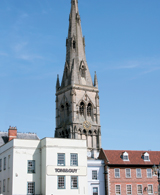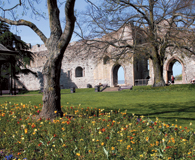 Adjacent to Hawtonville is Newark’s hospital. Like every other facility in this proud, old town, the hospital is built on the site of earlier versions and has been and continues to be a source of both pride and anxiety. As Britain’s population ages, so does Newark’s, and the demands on National Health Service properties such as our hospital have grown exponentially. The difficulty is, of course, that healthcare has become both more expensive and more technical, with British health authorities seeking to achieve economies of scale whenever they can. So towns of modest size, like Newark, find it increasingly difficult to justify complex hospitals. It makes more economic sense for district hospitals to become centers of excellence in larger population centers. The logic of this is inescapable, but it still means that smaller communities get fewer health resources and people have to travel to access the latest medicines and techniques.
Adjacent to Hawtonville is Newark’s hospital. Like every other facility in this proud, old town, the hospital is built on the site of earlier versions and has been and continues to be a source of both pride and anxiety. As Britain’s population ages, so does Newark’s, and the demands on National Health Service properties such as our hospital have grown exponentially. The difficulty is, of course, that healthcare has become both more expensive and more technical, with British health authorities seeking to achieve economies of scale whenever they can. So towns of modest size, like Newark, find it increasingly difficult to justify complex hospitals. It makes more economic sense for district hospitals to become centers of excellence in larger population centers. The logic of this is inescapable, but it still means that smaller communities get fewer health resources and people have to travel to access the latest medicines and techniques.
While that may be logical, it’s unpalatable. Older people in the town resent having to travel for medical attention for which they have paid handsomely through taxes all their life. Recently Newark lost the facility to deal with heart attacks, not because of financial constraints as such, but because of increased capability and capacity in hospitals in Lincoln and Mansfield. And here’s the rub—Newark lies right at the eastern boundary of the county—outside the administrative bounds of Lincolnshire. This is difficult enough, but when the Byzantine organization of the NHS is grafted upon local factors, then difficulties multiply.
For instance, the local NHS is administered by two distinctly different healthcare trusts, the logic of which completely defeats me. The ambulance service (meant to whisk my constituents away from Newark into the centers of excellence mentioned above) is organised on a tri-county basis, whose headquarters is almost 40 miles away in the city of Derby! To an American reader, 40 miles may not sound like much, but to anyone who knows how difficult it is to move from east to west through the maze of minor roads in this part of Britain, 40 miles is an odyssey. The movement of patients is one thing, but the ability of loved ones to travel hither-and-yon across these road networks leaves the honest burghers of Newark exasperated.
I’ve mentioned the financial conditions in which both Britain and Newark find themselves at the moment, but the clearest demonstration of this is the state of our schools. Primary schooling (i.e., for children 5-11 years) has very capable schools throughout the constituency that are largely housed in adequate buildings. But our secondary schools are a major problem. All sorts of social factors mean that up to 40 percent of children coming into secondary school are categorised as “special needs.” In other words, they are reading at three years or more behind grade level.
So by the time these students get to secondary school, the staff has their work cut out. Unfortunately, the fabric of our three secondary schools has deteriorated so badly over the years that one needs to be bull-dozed and the other two need serious refurbishment. The problem here, though, is emotional as well as economic.
The last government made promises to rebuild and renovate all of the three schools. As the financial crisis deepened, though, it became obvious that putting this plan into practice was not possible. In the interim, however, the staff, parents and children had invested a huge amount of hope and faith in what their new schools might look like. And this, of course, took place when the schools were losing up to 1,000 student-hours per week, as the kids were sent home due to leaking roofs, broken boilers and a host of other physical problems. Sadly, the new Coalition Government scrapped the investment that had been promised to the schools and has made no other plans for what will happen. It was like a child promised a visit to the zoo that had to be cancelled who was told just that—the bald facts, with no lollipop and no vision of when another visit could be planned. The result was predictable anger.
These cuts necessitated by Britain’s economic quagmire have affected other areas as well. For instance, Newark has a proud tradition of administering justice to its own miscreants via our magistrates and local courts. When Justice Department cuts resulted in the axing of Newark Magistrates’ Court, I was deeply surprised because of the town’s relative isolation. Now those who have to appear in front of a court must travel almost two hours by public transport to Nottingham, witnesses and accused sometimes having to share the same busses. When someone is sent to prison, that individual is no longer incarcerated in Lincoln, but serves his or her time in Nottingham. That in itself is not the issue, but it does make visiting hellishly difficult for the prisoner’s family and dependents. 
Despite the challenges of our times, the mixture of characters in this part of the country is unique. The average Newarker is a delightful combination of resilience, cheerfulness, common sense and enormous good manners. This actually makes canvassing during elections quite difficult, because very few people are willing to tell me that they won’t vote for me. I come back with canvass cards that show 90 percent favoring my party; sadly that isn’t reflected when people go to the polls!
Combined with this wonderful mixture of characteristics goes a very strong independence of mind and spirit. The romantic in me tells me it’s because we live on the edge of Sherwood Forest, with its strong, maverick traditions and a love for outlaws! What it does make for, though, is for a set of people who will largely stand on their own two feet.
That’s why, for instance, the Polish community has been so successful in this town. The headquarters of the Free Polish Air Force was established here during the Second World War. Newark contains the largest Polish military cemetery in the UK, and the Poles remain an honored and welcomed part of our community. For instance, the Mayor’s Mace Bearers are traditionally of Polish birth or Polish background. And we have had a mayor whose first language is Polish. On the back of this relationship, many Polish immigrants have settled in Newark, and, in stark contrast to many other parts of the country, there has been no real friction. This is a considerable source of pride to me.
We also play host to a large Traveler community. Again, if you look back over the history of the region, fords and road junctions tend to attract travelling people, and as far as there is any permanence in such a way of life, Newark is it. So, caravans and horse-drawn carts are still a frequent sight in this town.
There has been enormous change to the local economy. I would still describe Newark as largely agricultural, but the number of people who are actually employed upon the land is remarkably small. British Sugar produces a substantial proportion of the nation’s sugars and sweeteners from the many thousands of acres of sugar beet around. Such farms, while large, though, are not manpower-intensive. A large part of our local revenue springs from the land, but not many people are physically employed there.
Another source of pride is the local charity called the Newark Patriotic Fund. It exists to help the wounded from our wars as well as their families, of whom we have a depressingly large number. If we want to raise money, the volunteers have only to stand in the center of Newark and sell wristbands to achieve an overwhelmingly generous response. The most humbling thing I’ve noticed is that the more ordinary, the less privileged the appearance of anyone whom you ask to give money, the more you are likely to get!
On reflection, I would describe Newark as a little bit of old England with a remarkably successful twist of the 21st century. When you’re next in this part of Britain, please come visit us. You will see and meet some of the most resilient and entrepreneurial people in Britain. All of the traditions that saw the Civil War decided here continue and I, for one, am proud to call myself a Newarker.




